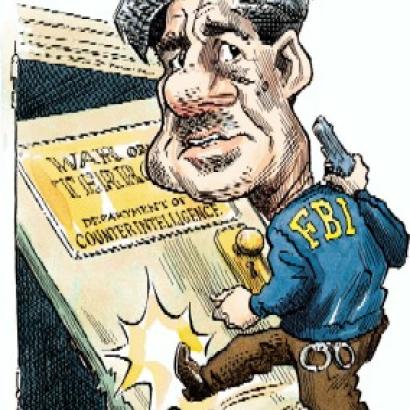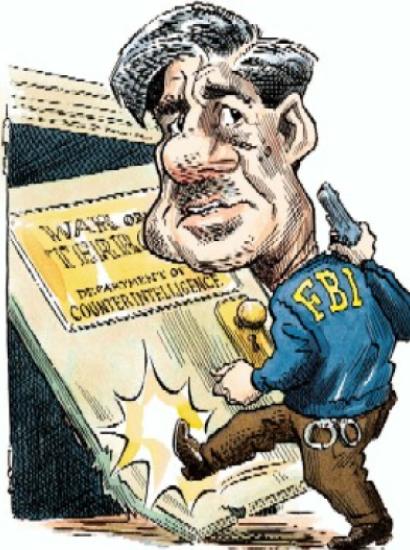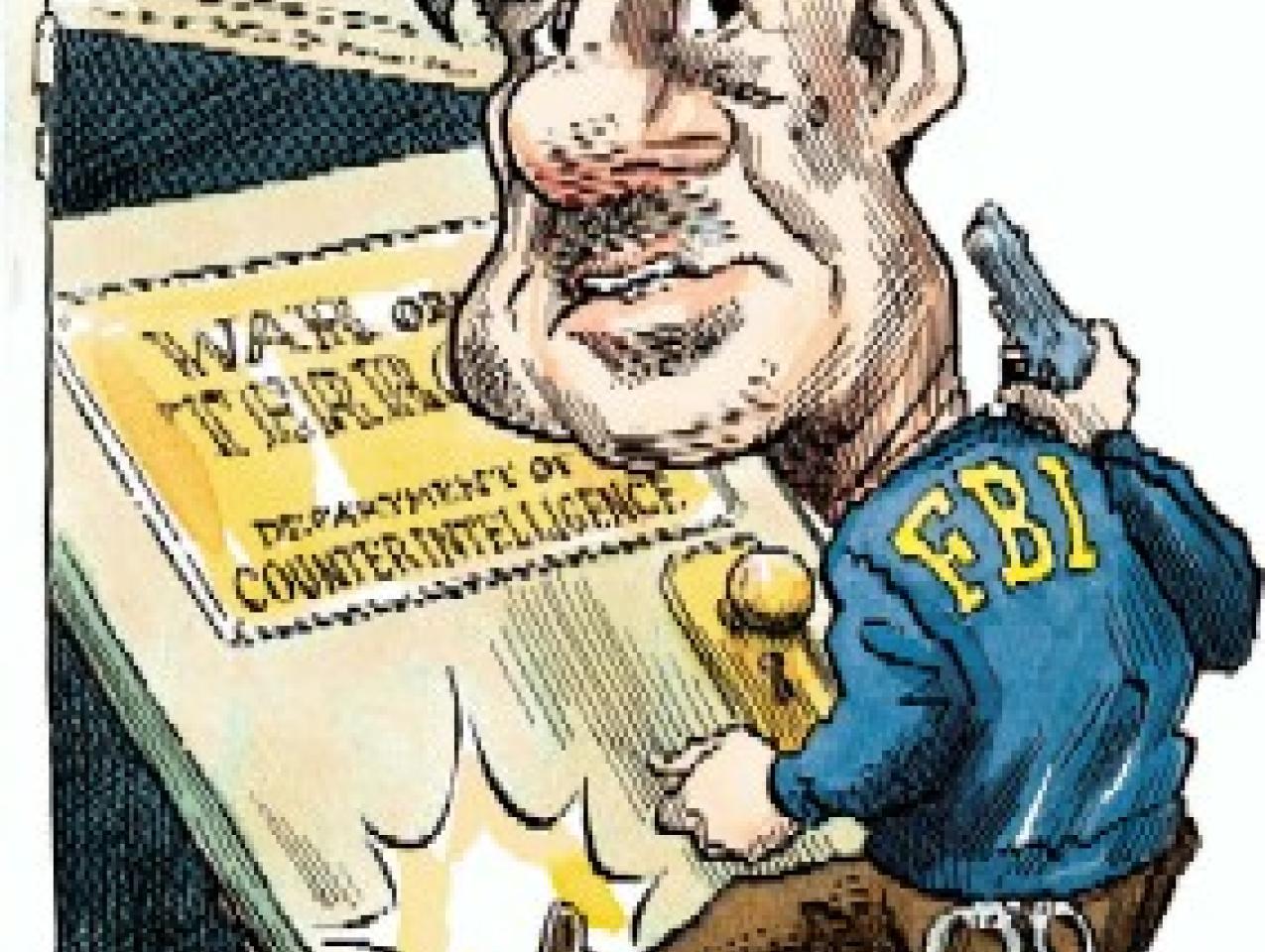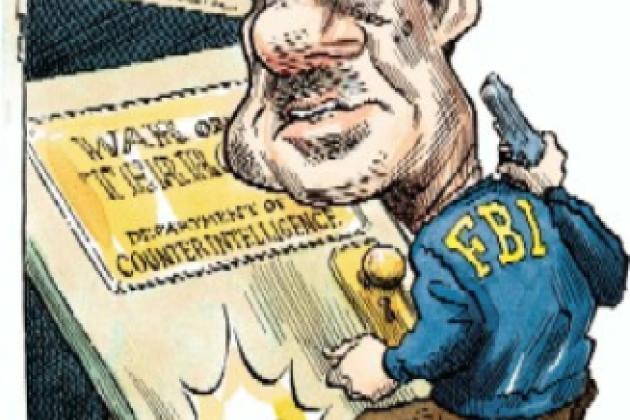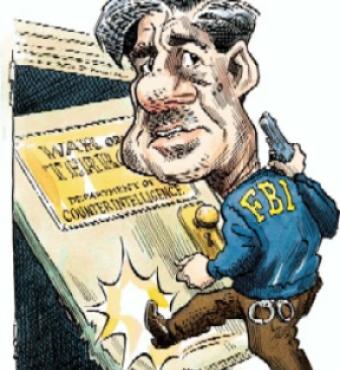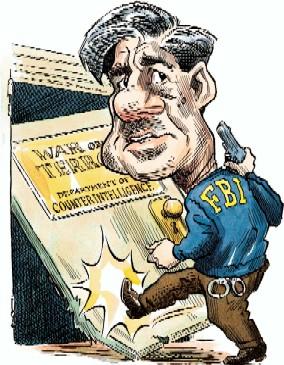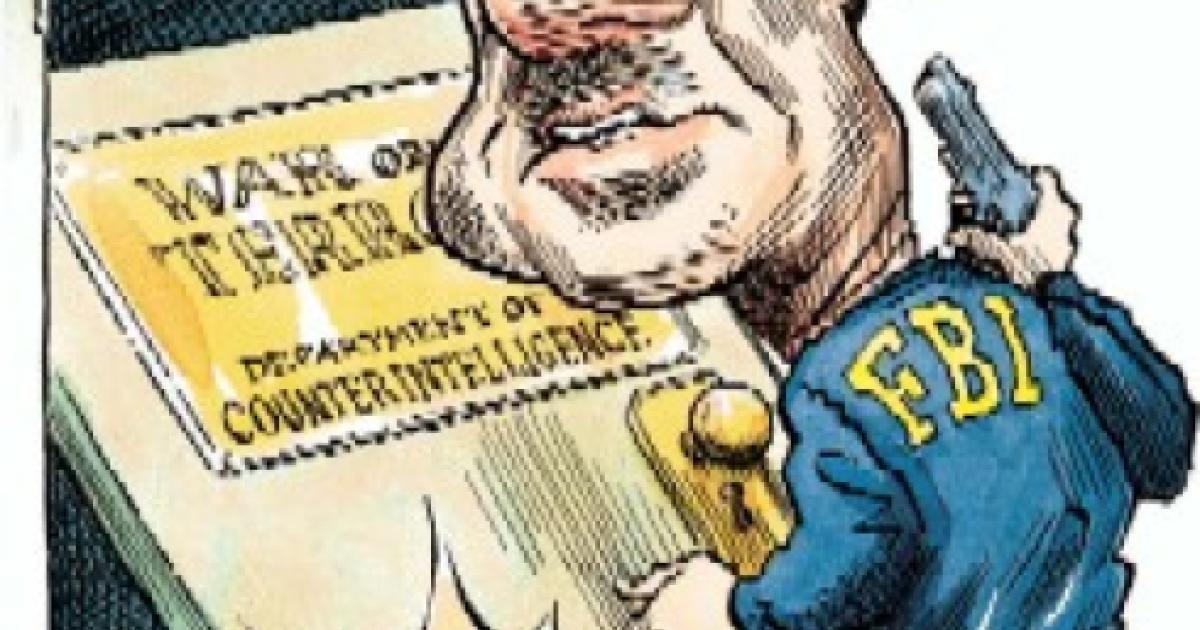- Security & Defense
- Terrorism
- Law & Policy
- The Presidency
- Politics, Institutions, and Public Opinion
The FBI is not the answer to the problem of domestic intelligence. As demonstrated by the 9/11 Commission’s report, the bureau turned in the most lackluster performance of any agency in the run-up to 9/11, even though it had (and has) the primary responsibility among police and intelligence services for preventing terrorist attacks on the nation from within. A request by one of the FBI field offices to apply for a warrant to search the laptop of Zacarias Moussaoui (a prospective hijack pilot) was turned down. A prescient report on flight training by Muslims in Arizona was ignored by FBI headquarters. There were only two analysts on the bin Laden beat in the entire bureau. Director Louis Freeh’s directive that the bureau focus its efforts on counterterrorism was ignored.
As Senator Richard Shelby, the vice chairman of the Senate Select Committee on Intelligence, pointed out in the wake of 9/11: “The bureau did not know what information it possessed, it did not approach this information with an intelligence analysis mind-set, and it too often neglected to inform other agencies of what it did know or believe.”
After 9/11 the bureau, under a new director, Robert Mueller, vowed to do better, but its efforts have fallen far short of success. In part because the bureau has been plagued by excessive turnover in the executive ranks of its intelligence and antiterrorism sections, and even more so in its information technology staff, it took the bureau two years after 9/11 just to devise a plan to reform its counterterrorism program. We know now that the plan was a failure, otherwise President Bush would not have forced the bureau, over its fierce opposition, to create (in 2005) the National Security Branch—a consolidation of the intelligence, counterterrorism, and counterintelligence divisions of the bureau. The NSB, however, has so far failed to change the bureau’s traditional culture.
The Structural Roots of the Problem
I am generally skeptical of organizational solutions to intelligence problems, most of which are not organizational problems. But the FBI’s inadequate performance of the domestic intelligence function is a genuine and serious organizational problem. Placing the domestic intelligence function in a criminal investigation agency ensures, as other nations realize, a poor fit.
| Criminal investigation is case oriented, backward looking, information hugging, and fastidious. Intelligence, in contrast, is forward looking, threat oriented rather than case oriented, and freewheeling. |
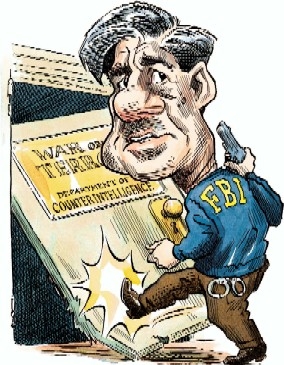
Criminal investigation is retrospective. A crime has been committed and the investigators go about trying to find the criminal; when they do, they arrest him and continue gathering evidence that will be admissible in court to prove his guilt. If the criminal activity under investigation is by nature ongoing, as in the case of gang activity, the investigator may decide to allow it to continue until the activity generates irrefutable evidence of guilt. But then he will pounce. And at every stage he’ll take great care not to commit a procedural violation that might jeopardize a conviction. He will also balk at sharing with others any of the information that he obtains in his investigation, lest a leak tip off a suspect or make it easier for the suspect to defend himself in court should he be prosecuted. All that the sharing of information about a case can do from the FBI agent’s perspective (as well as that of the local U.S. Attorney, for whom the agent works, in effect) is to weaken his ability to control the future of the case.
Criminal investigation is case oriented, backward looking, information hugging, and fastidious (for fear of wrecking a prosecution). Intelligence, in contrast, is forward looking, threat oriented rather than case oriented, and freewheeling. Its focus is on identifying, and maintaining surveillance of, suspicious characters and on patiently assembling masses of seemingly unrelated data into patterns that are suggestive of an emergent threat but that may be based on speculative hypotheses far removed from probable cause, let alone from proof beyond a reasonable doubt.
| Criminal law enforcement is oriented toward punishment, but punishment cannot undo the consequences of a catastrophic attack. |
When intelligence is working well, the spy or traitor or terrorist is detected early, before he or she does damage, and often he or she can be turned to our advantage. The orientation of intelligence toward preventing crimes from occurring or even from being contemplated, rather than toward prosecution after they occur, would prevent a domestic intelligence agency from obsessing over procedural missteps that might jeopardize a conviction.
The FBI argues that because terrorist acts are criminal and intelligence is an element of criminal law enforcement, counterterrorism intelligence can be assimilated to the FBI’s criminal law enforcement responsibilities. But the activities with which national security intelligence is concerned differ greatly from ordinary federal crimes. Terrorist activities are politically motivated (in a broad sense of “political” that includes motivations founded on religious, class, racial, or ethnic hostility) and are potentially much more dangerous than nonpolitical crimes because they aim to injure or destroy the nation as a whole or otherwise wreak havoc on a large scale. To counter terrorist activity requires knowledge—of political movements; foreign countries and languages; the operational methods of terrorists, spies, and saboteurs; and the characteristics and availability of weapons of mass destruction—that criminal investigators do not possess. It also requires a different mind-set.
Good police officers learn to think like criminals; good intelligence officers learn to think like terrorists and spies. The hunter must be empathetic with (as distinct from sympathetic to) his quarry, but cops and spies have different quarry.
As explained by intelligence veteran William Odom,
FBI officials want arrests and convictions. They want media attention and lots of it. . . . They have little patience for sustained surveillance of a suspect to gain more intelligence. To them, sharing intelligence is anathema. Intelligence is something to be used, not shared. . . . Intelligence officials do not want public attention. They want to remain anonymous. They do not need arrest authority. They want to follow spies and terrorists secretly, allowing them to reveal their co-conspirators. Their reward comes from providing intelligence to others, not hiding it. . . . [They] tend to be more thorough, taking their time to develop evidence both for trials and for operational use. They know that they cannot let spies or terrorists get away without risking considerable danger to the country. Cops worry much less that a criminal will get away. Criminals are abundant and there are plenty more to arrest. Spies and terrorists will almost always defeat police officers.
Punishment and Prevention
Criminal law enforcement is oriented toward punishment, but punishment cannot undo the consequences of a catastrophic attack. Criminal law aims to deter crime by punishing a large enough fraction of offenders to make the threat of punishment credible, as well as to incapacitate those offenders whom the threat of punishment did not deter from committing crimes, by locking them up or in extreme cases by executing them. Especially because many of the most dangerous modern terrorists are largely undeterrable, notably suicide bombers, law enforcement alone cannot defeat terrorism.
| Good police officers learn to think like criminals; good intelligence officers learn to think like terrorists and spies. The hunter must be empathetic with his quarry to catch him, but cops and spies have different quarry. |
Law enforcement can actually impede the struggle against terrorism: sometimes by prematurely revealing what the government knows, thus giving the terrorists a chance to elude capture by changing their methods or locale; at other times by failing to intervene early enough (that is, before a crime has been committed). Identifying, assessing, and tracking activities in the preparation stage are quintessential intelligence tasks, but the activities themselves often are too ambiguous to be readily provable as crimes. Some are only minor crimes, some not crimes at all. Prosecuting persons suspected of being involved in the early stage (discussion, target surveillance, etc.) of preparing a terrorist attack may, when feasible, have value in deterring entry into that stage. Yet often the more effective strategy is not to arrest and prosecute at that stage but rather to monitor the suspects in an effort to learn the scope, intentions, membership, and affiliations of the terrorist or prototerrorist cell.
| The two worlds of law enforcement and intelligence don’t fit comfortably together in the same agency—let alone in the same individual. |
An agency that is not responsible for bringing criminals to justice can concentrate full time on pursuing terrorists without any of the distractions created by the complex demands of criminal justice (including concerns with discovery and proof). Success from the standpoint of intelligence can be chasing terrorists out of the country and making sure they don’t return, or even leaving them in place but turning them into government infor-mants. But detecting threats and preempting them before they are carried out may leave no room for successful prosecution—which is a clue to the difficulty of adapting a law enforcement agency to the intelligence role. Prosecutable crime is the lifeblood of law enforcement.
The proper aim of counterterrorism is to penetrate and control terrorist cells, not to cause their members to scatter as soon as the arrest of one rings a warning bell to the others. Penetration, “turning,” control, and disinformation are delicate intelligence operations requiring specialized skills, training, and aptitudes unlikely to be acquired and honed by FBI special agents converted temporarily into intelligence operatives.
Consider the FBI’s 2002 arrest in Lackawanna, New York, of six men of Yemeni descent who had attended an Al Qaeda training camp in Afghanistan. A domestic intelligence agency might have tried to infiltrate the group or to “flip” one of its members, turning the group into an asset against Al Qaeda. Instead, the suspects were arrested and charged in a highly publicized case. The same pattern of premature arrest and prosecution recurred with the “Miami 7,” a group of wannabe terrorists apprehended earlier this year.
| An agency that is not responsible for bringing criminals to justice can concentrate full time on pursuing terrorists without any of the distractions created by the complex demands of criminal justice. |
The law enforcer’s approach to terrorism has the further disadvantages of causing intelligence data to be evaluated from the too-limited perspective of its utility in building a criminal case, and of retarding the sharing of information lest full credit for a successful prosecution be denied the field office that began the investigation. These disadvantages illustrate the difference, which is fundamental, between collecting information for the sake of knowledge and collecting it for the sake of building a case.
An incident involving the arrests in New York of two Muslim teenage girls whom the FBI suspected of wanting to become suicide bombers, and held in custody for six weeks, illustrates how emphasis on a criminal-law response to terrorism can impair vital “hearts and minds” strategies as well as (as may have happened in the Lackawanna case) shut down inquiry prematurely. The arrest of the two girls caused indignation in the New York Muslim community—whose loyalty and goodwill (as the FBI recognizes) are vital safeguards against domestic terrorism. It is natural for a law enforcement agency to want to arrest a person suspected of criminal activity. An intelligence agency, rather than wanting the girls arrested, would want to discover who had put the idea of becoming suicide bombers in their minds (maybe no one). Its low-key investigation might culminate in simply a chat with the girls’ parents. If the girls had a connection, however indirect, with a terrorist cell, the publicity from their arrest doubtless caused the members to scatter—and to reconstitute the cell elsewhere, out of sight of the FBI.
Clashing Cultures
The problem at base is related to the very different “cultures” of law enforcement and intelligence. The performance of criminal investigators, unlike that of intelligence officers, can be evaluated by objective, indeed quantitative, criteria, such as number of arrests weighted by successful convictions, with successful convictions weighted in turn by length of sentence imposed, amount of property recovered, and amount of favorable publicity generated. Intelligence officers cannot be evaluated by such objective criteria; their successes are often invisible, indeed unknowable. For example, the earlier a plot is detected and disrupted, the more difficult it is to know whether it ever had a chance of success. And information obtained by intelligence officers may be only a small part of the total information that enabled a threat to be detected and thwarted.
This asymmetry of performance measurement makes it difficult for a police department to hire and retain able intelligence officers. Able employees prefer objective to subjective performance criteria; they know they’ll do better if they are judged by such criteria than if their performance is evaluated by nonobjective, nonquantifiable, criteria that may include personality, appearance, personal connections, and sheer luck. Thus in an agency such as the FBI that combines criminal investigation with intelligence, the abler recruits will gravitate toward criminal investigation. They may be required to undergo some intelligence training and to do stints in intelligence jobs, but always they will be looking to return to the main career track.
| Because of the gravity of threats to national security, intelligence officers must track down any lead, however implausible, that might point to an attack that would endanger national security. Chasing such will-o’-the-wisps is simply alien to the police mentality. |
Henry Kissinger has remarked that “intelligence personnel in the real world are subject to unusual psychological pressures. Separated from their compatriots by security walls, operating in a culture suspicious of even unavoidable secrecy, they are surrounded by an atmosphere of cultural ambiguity. Their unadvertised and unadvertisable successes are taken for granted, while they are blamed for policies that frequently result from strategic rather than intelligence misjudgments.” This does not sound like the description of an FBI agent, and it casts grave doubt on the wisdom of the FBI’s method of obtaining intelligence officers, which is to provide intelligence training to its special agents, all of whom are hired and trained as criminal investigators.
The two worlds of law enforcement and intelligence don’t fit comfortably together in the same agency—let alone in the same individual, the special agent with intelligence training who shuttles between the two worlds.
Most of the FBI’s employees, including 90 percent of its special agents, as distinct from its support staff, are stationed in the bureau’s 56 field offices rather than in its Washington headquarters. This geographic dispersal is another reflection of the bureau’s emphasis on criminal investigation and another impediment to the conduct of national security intelligence. Most federal crime is local and is prosecuted locally by one of the 96 U.S. Attorneys’ offices, which like the FBI’s field offices are scattered across the nation. The FBI agents in these offices essentially work for the U.S. Attorney, who is a prosecutor, not an intelligence official. But although most federal crime is local, the principal dangers to domestic security at present emanate from international terrorist groups. Clues to their activities may be scattered all over the world. Effective intelligence requires combining scraps of information regardless of geographic origin rather than allowing information to be sequestered in local offices.
I use “scraps” advisedly; it brings out still another problem with confiding domestic intelligence to the FBI. Because of the gravity of threats to national security, intelligence officers must track down any lead, however implausible, that might point to an attack that would endanger national security. Most of those leads lead nowhere, let alone to an arrest, prosecution, conviction, and sentence. Chasing such will-o’-the-wisps is simply alien to the police mentality.
The marriage of criminal investigation and domestic intelligence within the FBI has complicated the coordination of domestic and foreign intelligence. Often the same suspects are tracked outside the United States by the CIA and inside by the FBI’s intelligence divisions. Yet the CIA and FBI have a history of mutual suspicion and antipathy. This had begun to diminish even before 9/11, especially at the top of the two agencies. But the cultural and procedural gulf between criminal investigations and intelligence operations remains, has been aggravated by recent efforts of the bureau to snatch turf from the embattled CIA, and impairs coordination between the two agencies, just as it does within the FBI.
An agency 100 percent dedicated to domestic intelligence would do better at it than the FBI, which is at most 20 percent intelligence and thus dominated by the criminal investigators.
All this is unlikely to change. The effective control of an organization requires some uniformity in compensation methods, recruitment, evaluation, promotion, and working conditions in order to minimize conflict, foster cooperation, and avoid confusion and uncertainty.
If the missions assigned to the organization are too disparate—if their optimal performance requires different methods, personnel policies, supervisory structures, information technology, and so on; if indeed, as in the case of criminal investigation and domestic intelligence, the missions are incompatible—the compromises necessary to impose the requisite minimum uniformity will cause performance of the missions to be suboptimal.
If shoes came in only one size, they would be cheap to manufacture but most people would be poorly shod. Because criminal investigation is the dominant mission and prevailing culture of the FBI, the inherent tensions between criminal investigation and national security intelligence will continue to be resolved in favor of criminal investigation.








